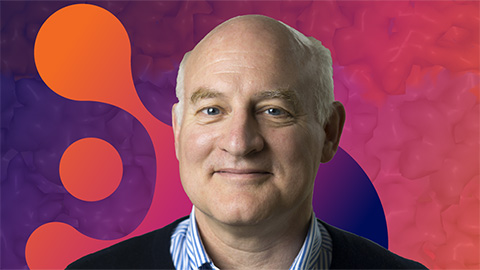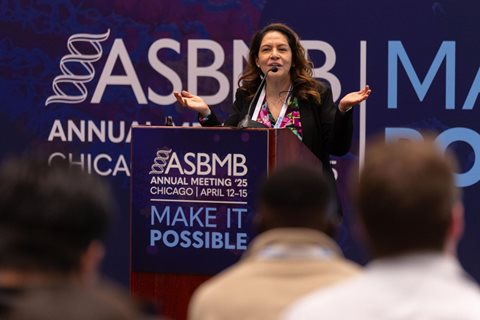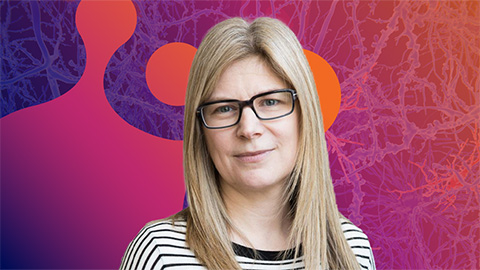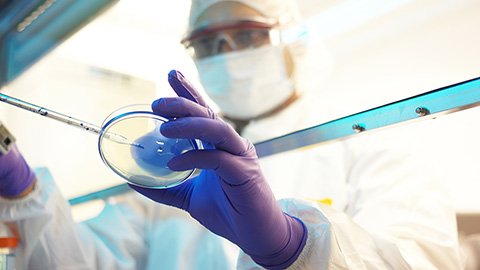Changing labs in grad school
Picking a research mentor and lab is a critical step during the journey toward a Ph.D. or master’s degree. Your mentor should serve as your advocate and adviser during graduate school, and a positive mentor–mentee relationship can be key to success and happiness along the way.
In my Ph.D. program, students typically went through three trial periods — also known as rotations — with different mentors and labs and then picked one mentor to work with for their thesis work. In theory, this mentor and lab selection should last for the rest of graduate school.
But that isn’t always the case. Sometimes it’s necessary to change mentors and labs partway through. If you’re thinking about changing labs, you may be feel like the move would push you off course.
I’m here to tell you that changing labs is probably more common that you think and to provide my input on some key questions about making the switch.
Why would you change labs?
There are lot of reasons you might want or need to change labs in graduate school.
The lab you so carefully selected after rotations may just end up not being a good fit.
Maybe the research topic you were sure you were passionate about is boring you to tears and you cannot imagine working on it any longer. Or maybe the management style and level of support from your mentor doesn’t match with what you want and need.
A few students from my graduate school ended up changing labs because of a poor lab fit. Two of them switched early on, within the first year after joining, and one switched much later, after the qualifying exam process.
While it may seem daunting to switch labs and seemingly start over once you have a year or more of research under your belt, finding a better fit in terms of mentorship and research will benefit you in the long run. The graduation timelines of the students I knew were only minimally impacted, and their overall happiness in lab improved.
There also may be reasons you have to change labs that are entirely based on your mentor. For example, they could get a position at another institution before your degree is complete, which happened to a friend of mine. In this case, your program director will likely work with you and your mentor to establish a plan and path forward. For my friend, she was only about a year out from graduating, so she ended up using space in my lab for a bit while she finished her last research push. The process will probably look different for those earlier in their graduate program.
It is possible, but rare, that your mentor will fun out of funding. My graduate program confirmed that labs had enough funding to theoretically cover the length of a student’s degree before allowing the student to join the lab, but that isn’t the case everywhere. Here, again, your program director should step in and help find a suitable (and funded) replacement lab for you.
How do you change labs?
If you think a lab change is the decision for you, having an initial conversation with an adviser other than your mentor may be beneficial. This could be a thesis committee member or another faculty member whom you trust. Discussing the reasons you are thinking about switching labs may help you chart a clearer path forward. Many programs have online resources explaining the lab-switching process, and they can be good initial guides as well.
A conversation with your program director is also a must. They can help you understand the administrative steps needed to facilitate the change and hopefully will help guide you through any delicate conversations you need to have with your mentor.
Also think about what new lab you would want to join. Consider your research interests as well as what works for you in terms of mentorship style. In theory, your current lab experience would have given you an indication of what doesn’t work for you, so make sure your new lab and mentor don’t have the same traits.
Your program director might be able to tell you which mentors are able to take on new students. If you already have a working relationship with your preferred new mentor, you could also try talking to them about the possibility of joining their lab.
Of course, you will need to speak with your current mentor as well. Explaining the reasons you want to switch labs in an open yet respectful way can help improve the chances of ending on a good note. After all, your mentor should want to see you succeed, even if it is somewhere else.
In the end, it’s up to you to determine if switching labs is the right move. Seeking input and advice early can help the transition go smoothly.
Enjoy reading ASBMB Today?
Become a member to receive the print edition four times a year and the digital edition monthly.
Learn moreFeatured jobs
from the ASBMB career center
Get the latest from ASBMB Today
Enter your email address, and we’ll send you a weekly email with recent articles, interviews and more.
Latest in Careers
Careers highlights or most popular articles

Building the blueprint to block HIV
Wesley Sundquist will present his work on the HIV capsid and revolutionary drug, Lenacapavir, at the ASBMB Annual Meeting, March 7–10, in Maryland.

Upcoming opportunities
Present your research alongside other outstanding scientists. The #ASBMB26 late-breaking abstract deadline is Jan. 15.

Designing life’s building blocks with AI
Tanja Kortemme, a professor at the University of California, San Francisco, will discuss her research using computational biology to engineer proteins at the 2026 ASBMB Annual Meeting.

Upcoming opportunities
#ASBMB26 late-breaking abstract submission opens on December 8. Register by Jan. 15 to get the early rate on our Annual Meeting.

Make your abstract stand out
Ensure your research is impossible to overlook. Get quick, practical reminders for crafting an abstract that attracts readers and helps you build connections at the conference.

Inside industry postdocs
As more Ph.D. scientists look beyond academia, industry postdocs offer a new kind of training, where mentorship meets mission-driven research. Fellows at Pfizer and Genentech share how these programs prepare them to translate discovery into impact.

